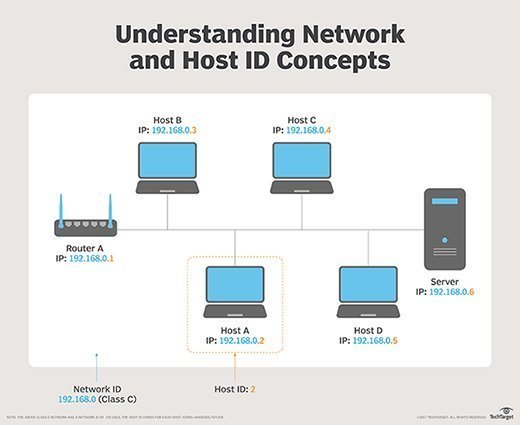What is a host (in computing)?
A host is a computer or other device that communicates with other hosts on a network. Also known as network hosts, hosts include clients and servers that send or receive data, services and applications.
Hosts typically don't include intermediary network devices, such as switches and routers, which are instead categorized as nodes. A node is a broader term that includes anything connected to a network, while a host requires an IP address. In other words, all hosts are nodes, but nodes are not hosts unless they require an Internet Protocol (IP) address to function.
Hosts use various protocols to communicate, including Transmission Control Protocol (TCP) and User Datagram Protocol. On a TCP/IP network, each host has a host number that, together with a network identity, forms its unique IP address. In the Open Systems Interconnection model, protocols in the transport layer -- also known as Layer 4 -- are responsible for communication between hosts.
Types of IT hosts
Several other areas within IT use the term host, so it carries a slightly different meaning depending on the context. For example, a host can also be a device or program that provides services to smaller or less-capable devices or programs. The following are other major IT contexts that use hosts.
Web host
For companies or individuals with a website, a host is a web server that stores and transmits data for one or more websites. A host also refers to the service provider leasing this infrastructure, known as hosting.
Cloud host
Based on cloud computing technologies, a cloud host enables many servers to act as one system, in which multiple machines guarantee website performance. It often includes a network of servers pulling from different data centers in different locations.
Cloud hosts operate as a service, enabling clients to buy as much of it as they need. Cloud hosting is an alternative to hosting a website on a single server. Cloud hosting is considered both infrastructure as a service and platform as a service. Using a public cloud model, a public network transmits data physically stored on shared virtual servers that make up the cloud resource.
Virtual host
The term virtual host has two uses. One refers to technology used to run multiple domains or applications on a single physical server. The second refers to companies that sell virtual infrastructure services.
Remote host
In this context, users access a remote host in a different physical location using a private network or the internet. This process provides users with remote access. Examples include servers that users can log in to remotely or a host computer for a remote desktop.

Host virtual machine
This refers to the hardware that provides computing resources to support virtual machines. This process is also known as server virtualization.
Mainframe computer environments
In this context, a mainframe computer can be the host provider of services for the workstations attached to it. This doesn't mean the host only has servers and the workstations only have clients. The server-client relationship is a programming model independent of this contextual usage.
Hostname
A hostname is a plaintext name identifying a host in a given domain. On a local area network, a server's hostname might be a nickname such as mailserver1. On the internet, a hostname makes up part of a web address and has three parts:
- Subdomain.
- Domain name.
- Top-level domain.
For example, the hostname subdomain.example.com consists of the subdomain subdomain, the domain example and the top-level domain .com.







